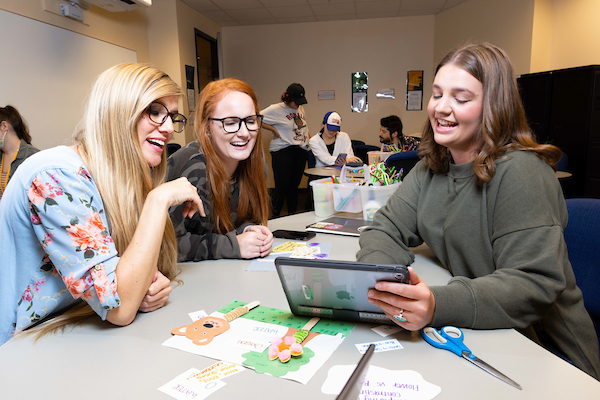Secondary Education
Learn More About Secondary Education
Admission Requirements
Students may initially declare an "-Interest" based major in this subject, but must still meet additional requirements to be formally accepted into the degree program.
Click Here for more information on teacher education admission requirementsGeneral Education Core IMPACTS Curriculum Recommendations for this Major
M: Students should take MATH 1113 or higher.
T: Students should take MATH 1179 or higher.
T: Select two course pairs from the following: CHEM 1211/L, CHEM 1212/L, PHYS 1111/L*, PHYS 1112/L, PHYS 2211/L*, PHYS 2212/L, BIOL 1107/L, or BIOL 1108/L. *Students cannot take both PHYS 1111/L and PHYS 2211/L nor PHYS 1112/L and PHYS 2212/L.
Sample Classes
-
SCI 3360: Earth Science
An introduction to basic earth science concepts and methodology (including geology, meteorology, and oceanography) will be covered. Special emphasis will be placed on dynamic Earth processes (plate tectonics, earthquakes, volcanism, climate, etc.) and their effects on the structure and composition of the landforms, oceans, atmosphere, and organisms. The lab component includes hands-on evaluation of a collection of Igneous, Metamorphic and Sedimentary rocks, topographic map analyses, spectral imaging and remote sensing, and modeling weather related phenomena.
-
SCED 4414:Methods of Teaching Secondary Science I
This course examines teachers, students, content, and interactions that lead students to develop conceptual understandings of science. Science teacher candidates design and implement instructional activities informed by understanding of science learning, then assess student learning. The co-requisite for this course is a 60 hour field experience as introduction to the adolescent learner, the equity imperative and science education reform.
-
EDSM 3360: Classroom Management in the Middle Grades and Secondary Education
This course prepares prospective middle grades and secondary math or science teacher candidates to create and manage positive, productive classroom environments with a diverse population of learners. Candidates will develop a comprehensive understanding of the learning and behavior principles that underlie effective classroom management and acquire the strategies and skills needed to implement an effective management program.
-
MAED 4414: Pedagogical Content Knowledge for Mathematics I
This is the first of three courses in a professional sequence toward becoming a well-prepared beginning secondary mathematics teacher. Topics include introductory ideas about mathematics education, including current mathematics standards and policy documents, cognitive learning theories, and teaching frameworks. Students will explore how secondary students think about and learn mathematics, examine how to select and modify tasks, use appropriate manipulatives and technology, differentiate instruction, and apply their learning in an accompanying field experience.












